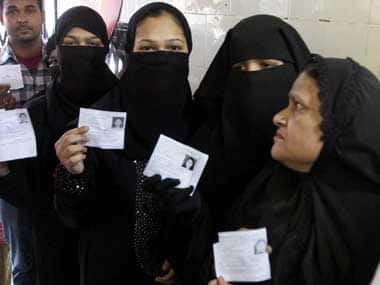Jaipur: Is Narendra Modi dividing voters on communal lines? Is the minority community willing to embrace him and the BJP? Do Muslim politicians have a future in the Congress? The answers are hidden in the fine print of Rajasthan elections. Rajasthan has 200 Assembly seats. It has nearly nine percent Muslim voters. The Congress gave tickets to 16 minority candidates. None of them won; a failure rate of 100 percent.[caption id=“attachment_1279103” align=“alignleft” width=“380”]  Representational image. PTI[/caption] The BJP, on the other hand, gave tickets to four from the minority community. Two of them triumphed, leading to a success rate of 50 percent. In 2008, there were 12 MLAs from the minority community. Considering all the noise about Muslim voters coming out in large numbers to support the Congress and reject Modi, the numbers should have gone up this year. For the first time in the history of Rajasthan, the minority community has just one percent representation in the Vidhan Sabha. And, ironically, both these MLAs are part of the saffron parivar. There could many explanations and messages. Congress should forget TINA: Ground reports from many constituencies in Rajasthan during the campaign indicated Muslims were unwilling to be treated as the Congress’ captive votebank. At many places they openly revolted against Congress heavyweights. Their first priority was to ensure the Congress gets routed even if the BJP wins. State Congress chief Chandrabhan lost his deposit in Mandawa, a traditional Congress bastion with a large number of Muslim voters. In Sikar, another Muslim stronghold, the minority community voted for its own candidate against Congress heavyweight Rajendra Pareek. This is a clear sign that the Congress should stop dreaming that minority voters will cling to it because of the TINA factor. Yes, Modified BJP is acceptable: For argument’s sake, let us consider that Muslims wanted to keep Modi out. Logically, they should have tactically voted against the BJP. Even if they were angry with the Congress, at least the presence of a minority candidate should have softened them. But that didn’t happen either. In Sheo, Barmer, Manvendra Singh defeated Amin Khan of the Congress in spite of the fact that the minority vote had the power to decide the outcome. In Nagaur, the Congress candidate, a Muslim, forfeited his deposit. The winner was a Muslim, but he was contesting on the BJP ticket. It is clear that minority voters preferred the BJP even in a Muslim vs Muslim contest. Evidently, the Congress has run out of all options to retain the minority vote. Muslim candidates have no future in the Congress: During a meeting chaired by Congress leader Ghulam Nabi Azad in Rajasthan, Muslims reportedly complained they have no future in the Congress. Their poignant argument: we vote for your candidates in 200 seats. But your traditional voters from the other communities migrate to the BJP wherever the Congress gives tickets to a Muslim. Their fear is justified by the results. Not one out of the 16 minority candidates managed to win. They lost in villages, cities, metros; they lost even in areas with high percentage of Muslim voters. Saffron parivar growing, becoming liberal: The results prove that the Congress’ attempt to cry ‘Modi aaya, Modi aaya’ failed to mobilise the minority vote. But it helped the BJP consolidate its base among other communities. But unlike the traditional Congress voter, the core base of the BJP is willing to embrace minority candidates. In Deedwana, Nagaur, Younus Khan of the BJP defeated the Congress’ Jat candidate. Nagaur is a Jat stronghold. There was a Rajput also in the fray. But still the BJP candidate won. It shows the BJP candidate was favoured by all castes and communities. The voting pattern throws up two interesting hypotheses. Muslims are not winning on the Congress ticket. Does this mean that the Congress voter preaches secularism in public but acts on communal lines in the privacy of polling booth? The entire minority representation in the Vidhan Sabha has come via the BJP. Does this mean that the BJP voter, ridiculed as pro-Hindutva and anti-minority, has become more liberal than a Congress supporter? Does the ‘communal’ party have liberal voters? Does the votebank of the ‘secular’ have communal leanings? If probed deeper, the answers could turn Indian polity on its head. There are clear indications for both the Congress and the BJP from the results in Rajasthan. The Congress should stop dreaming that the Modi factor will help it in the Lok Sabha elections. For the minority voters, the Congress seems to be the bigger evil. The BJP should start believing that it can benefit immensely from the mindset of voters. By giving more tickets to those from the minority community it can not only become more inclusive but also ensure Muslims get their deserved representation. Opportunity has come to Modi’s door via Rajasthan. Is he ready to embrace it?
For the first time in the history of Rajasthan, the minority community has just one per cent representation in the Vidhan Sabha. And, ironically, both these MLAs are part of the saffron parivar.
Advertisement
End of Article


)
)
)
)
)
)
)
)
)



